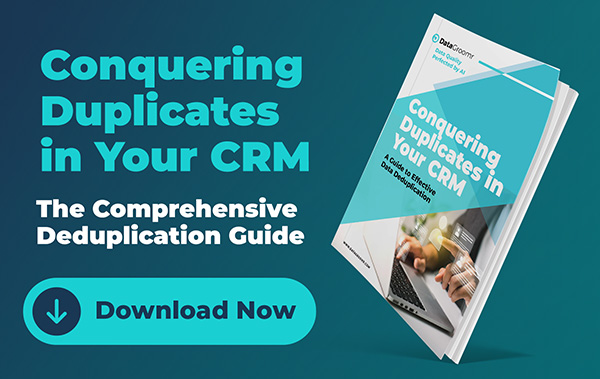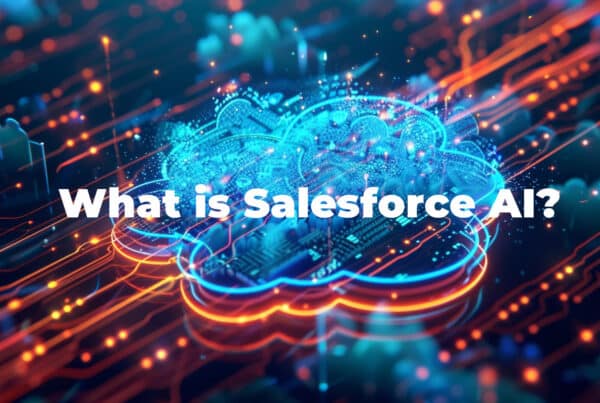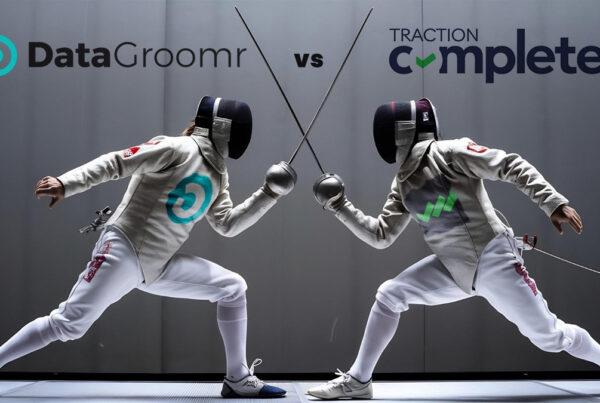
AI as a Catalyst in Salesforce Consulting
Artificial Intelligence is transforming how consultants approach Salesforce projects, especially in the discovery and process design phases. More traditional requirements-capture techniques, such as interviews, workshops and fixed documentation, can still be used but tend to be time consuming and can suffer from gaps or bias. By using AI-based technologies in Salesforce, including Einstein Analytics, Tableau CRM, and Einstein GPT, consulting teams can gather, process, and interpret data on a large scale.
Instead of relying on assumptions or anecdotal evidence, AI helps consultants discover actionable patterns that they can use to design better processes. AI can also help consultants streamline resource-intensive functions, navigate customer friction points and areas of automation, and provide future-proof insights to drive success.
Accelerating Discovery with Salesforce AI
The discovery process in Salesforce projects is often time-consuming due to manual data collection and stakeholder interviews. In addition to being time-consuming, this more manual discovery process can overlook minute patterns of customer behavior, sales operations, or service-related activities. With AI, discovery time is reduced and patterns can be more easily noticed because the tool ingests and analyzes large amounts of data across the various Salesforce clouds: Sales Cloud, Service Cloud, Marketing Cloud, and others.
For example, NLP functionality in Einstein AI can review thousands of comments on customer cases or mail threads to identify repeat problems or customer sentiment shifts. Predictive analytics can help point out leads most/least likely to convert, high-risk accounts, or inefficiencies in current processes. AI helps consultants quickly identify areas with the greatest business impact, guiding their discovery efforts and enabling them to make evidence-based recommendations.
The Importance of Quality Data
Any AI-driven Salesforce initiative depends on high-quality data. Inconsistent or incomplete data, including duplicates, invalid fields, or different formats, may hamper the efficiency of AI considerably, resulting in inaccurate insights or faulty process suggestions. AI tools should be implemented only after prioritizing data cleansing, enrichment, and governance. Salesforce offers built-in capabilities such as duplicate management, Data Loader, and validation rules to help users maintain clean, consistent, and reliable datasets. In addition, many organizations complement these with third-party solutions to extend functionality and automation. With high-quality, reliable sources of training data, AI can achieve accurate predictions, meaningful patterns and develop process designs that can deliver tangible business results.
Designing Smarter Salesforce Processes
AI is more than just data analysis; it guides the design of more intelligent, adaptive and scalable processes. Predictive lead scoring, for example, will aid in creating sales processes that prioritize the highest potential prospects. Einstein Recommendations can recommend the next best actions to be taken by service agents or marketers. Process changes can be modeled through AI-based scenario models so consultants can test outcomes prior to making them, minimizing risk and maximizing efficiency. Additionally, with AI, processes are dynamic: machine learning models will improve routing rules, automation triggers and customer journey flows by learning over time. The outcome is a Salesforce ecosystem that is optimized for today and flexible enough to respond to emerging business challenges.

Enhancing Collaboration Across Stakeholders
Sound process design in a Salesforce project depends on business leaders, IT personnel, and end users being on the same page. AI tools complement this objective by offering real-time insights and visualizations, using tools like Tableau dashboards to simplify in-depth data sets. Sentiment analysis can be used to determine levels of engagement between stakeholders, areas of resistance and areas where more communication or training is required. Knowledge search and case deflection in Service Cloud (also powered by AI) will help teams rapidly identify best practices and learnings from previous projects, accelerating co-design sessions. Through data-driven collaboration, AI guarantees that every participant can contribute to the design process in a meaningful way and with accountability.
Driving Adoption and Change Management
The best-designed Salesforce processes will fall short unless they are well adopted. AI can aid change management by analyzing areas of engagement, forecasting possible areas of resistance, and delivering individual recommendations to end users. When powered by Einstein Analytics, Salesforce can monitor the rate of adoption, alerting areas that may require more attention. Automatic training recommendations, in-app prompts, and chatbots present users with contextual guidance throughout new workflows, driving efficiency and decreasing friction. By combining anticipatory knowledge with active support, consultants can ensure that the processes they design are not only implemented but also accepted across the organization.
Integrating AI with Automation and Flow
Salesforce Flow couples with Einstein AI to support consultants in designing processes that are highly automated but still smart. AI can tell you when to activate certain flows, e.g. escalation of a service case based on sentiment, automatically assigning high-value opportunities to top performers, or sending highly personalized customer messages in real time. Such integration enables consultants to design processes that reduce manual work, but that can be flexible enough to accommodate rapid changes in the business environment. Further, AI-optimized flows can learn and improve over time, creating a feedback loop where data-derived insights drive manufacturing process adjustments withoutneeding expert intervention.
Responsible Use of AI in Salesforce Consulting
While the potential of AI is enormous, these opportunities should be considered ethically and practically. Consultants need to make sure predictive models are devoid of biases, transparent, and explainable. Clients should be aware of how AI-generated insights are produced to preserve trust. Notably, AI is not supposed to eliminate human expertise but to complement it. Although AI is great at pattern recognition, forecasting, and automated rote tasks, consultants bring vision, imagination, and compassion, critical in process design and corporate restructuring. Using AI responsibly means recommendations can be depended upon, acted upon and are in the best interests of the business.
The Future of AI in Salesforce Process Design
Firms that apply AI to their Salesforce environment achieve a competitive edge by delivering speedier, cleverer, and more versatile process designs. Rather than spending weeks in manual discovery workshops, consultants can zero in on a baseline, confirm assumptions, and jointly design solutions. As an AI champion, the role of consultants is changing as they are becoming more of an insight orchestrator who is guiding a client through a transformation process with AI as trusted companion. AI combines high quality data, well-designed routine processes and proactive analysis to help organizations unlock the full potential of their Salesforce investment, delivering measurable improvements in efficiency, customer satisfaction, and bottom line performance.
FAQ
AI augments discovery by efficiently filtering through large amounts of Salesforce data. AI tools such as Einstein Analytics and Tableau CRM allow you to process customer interactions, sales activities, and operational logs to discover patterns, inefficiencies, and opportunities not detected through interviews alone. Natural Language Processing (NLP) is a set of tools that draw inferences about unstructured data, e.g. case notes, email conversations. Automation speeds up discovery, reducing time spent by consultants collecting data and increasing discovery accuracy.
Data is the gateway to creating high-quality insights and recommendations with AI. Data that aren’t good (i.e., duplicated, out-of-date, incomplete) may generate erroneous forecasting, unreliable workflow design, and wasted work. High quality, clean, consistent data is essential to power tools such as Einstein GPT, predictive lead scoring, and automated flows. Maintaining high quality data requires Salesforce functionality like Duplicate Management, Data Loader, and validation rules, as well as an effective data governance process and third-party tools.
AI can complement the work of consultants and make it better. It is very unlikely to replace it. Although AI is better at detecting trends, forecasting and automation, consultants are better equipped to analyze the business, be creative and align stakeholders. Human knowledge is vital to interprete AI-derived insights, make judgment calls and guide change management. AI can thus help consultants shift their attention to more value-added services such as process optimization, innovation, and adoption, allowing AI to perform mundane analysis and data processing.










